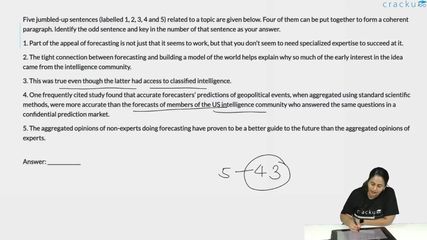Five jumbled-up sentences (labelled 1, 2, 3, 4 and 5) related to a topic are given below. Four of them can be put together to form a coherent paragraph. Identify the odd sentence and key in the number of that sentence as your answer.
1. Part of the appeal of forecasting is not just that it seems to work, but that you don’t seem to need specialized expertise to succeed at it.
2. The tight connection between forecasting and building a model of the world helps explain why so much of the early interest in the idea came from the intelligence community.
3. This was true even though the latter had access to classified intelligence.
4. One frequently cited study found that accurate forecasters’ predictions of geopolitical events, when aggregated using standard scientific methods, were more accurate than the forecasts of members of the US intelligence community who answered the same questions in a confidential prediction market.
5. The aggregated opinions of non-experts doing forecasting have proven to be a better guide to the future than the aggregated opinions of experts.
Correct Answer: 2
Here, Sentences 1, 4, and 5 discuss the general theme of how non-experts or forecasters without specialized expertise can make accurate predictions, often outperforming experts. Sentence 3 adds context by highlighting that this success occurs even when experts have access to classified information.
Contrarily, Sentence 2 shifts the focus to the “intelligence community's interest in forecasting models” rather than continuing the discussion on the accuracy and success of forecasters versus experts. This makes it unrelated to the main flow of the paragraph.
Let us examine the points presented in each sentence to further understand how the statements link. Sentence 1 introduces the main idea that forecasting is appealing because it works even without requiring specialized expertise. Building on this idea, Sentence 5 highlights that non-experts can often outperform experts in forecasting; this, in a way, relates to the appeal of forecasting introduced in the first sentence. Sentence 4 provides evidence to support the claim made in Sentence 5. It refers to a specific study where non-experts outperformed experts in predicting geopolitical events, solidifying the argument that non-expert forecasting can be more reliable. Sentence 3 strengthens the previous claim by highlighting that the experts, despite having access to classified intelligence, were still outperformed by non-experts. In this manner, the arrangement 1-5-4-3 renders a coherent paragraph.
Hence, Sentence 2 is the odd one out.
Video Solution

Create a FREE account and get:
- All Quant CAT complete Formulas and shortcuts PDF
- 38+ CAT previous year papers with video solutions PDF
- 5000+ Topic-wise Previous year CAT Solved Questions for Free



